Introduction
Marie is an Anglo Belgian family historian based in Brussels. Her specialist areas of research are centred around Belgium, Luxembourg, The Netherlands and North France as well as the UK and USA. Being multi-lingual she is a very handy person to know!
Blog
Now, where do you go? where to search next? Don't worry! We're here to help! This article will guide you through all the major sources in Belgium and hopefully put you on the right track.
First, you have to know that Belgium is a very young country, created in 1830 in the aftermath of the battle of Waterloo so not even 200 hundred years old and as a consequence it was ruled before that by various countries such as France, The Netherlands, The Austrian Netherlands and The Spanish Netherlands. You'll have to take that into consideration when undertaking your research.
Complicated? It may seem so but the more you'll browse through records, the more it will become a habit to come across a record in one language and then perhaps the next in another; For more recent records, Google translate might do the trick but forums and other researchers may help you understand the content of the records. Yes, Belgium is one complex country, with it's different governments, regions, communities and boroughs but it is also a captivating and interesting land!
The State is responsible for the keeping of institutional archives including BMD's. The main repository in Brussels-City only holds records from state institutions (and even then, not all of them) and the majority of ancient archives. All other archives, ancient and old will be in one of the 18 repositories all over the country so you have to know where you want to head to before pushing one of the reading rooms doors.
The same is true with Flanders. If you want to check a wedding record in Leuven, university town but presume that your ancestors also visited other places in Flanders, you'd be wise to go to Beveren where Leuven records can be seen along with other Vlaamse-Brabant, Oost-Vlaanderen, West-Vlaanderen and Limburg archives instead of just going to Leuven (except if your search is Leuven specific or you require an archive record that's only stored there).
Via “archives” (general keyword research) where you can pick up a region, define a town or village (take good note of the fact that the boundaries changed in 1977 with the merging of smaller villages) and directly view the records (bmd's and a complete parishes set) or
Via “persons” (linked to an ever growing database fed by hard working volunteers) where you can just ask if your “Anne Marie Maes” (equivalent of John Smith) is there.
The database is far from complete but it's a good tool to indicate a list of names, linked to places. This research can be mixed with other online research such as the LDS website but the results will never be as close as Belgium and the State Archives website.
Civil Registrations
First you have to know where your ancestor is from, or even have some rough idea of the regions for the aforesaid reasons. Unknown places can be very common in British records (a lot of census records mention “Belgium” without any further explanation) but they won't be much help, unless the surname was quite rare and from one region only.
The biggest difference that will strike you, if you’re used to research in the UK, or most specifically in England is that you’ll find much more information in Belgian certificates than in British. For birth records, you’ll find the full names (including mother's maiden name) and ages of both parents as well as occupations and address, and sometimes information about the grandparents if they recorded the birth. Don't assume that the father is not the same because the occupation doesn't match or because the mother first names sound incomplete. It may be a change of career and the mother may have a familiar name to go by, different from her official first name.
Death records will be shorter and will tell you of the full name, age, place of birth of the deceased as well as information on the information but, unlike in the UK, you will not find the cause of death. However, if the informant is a policeman or an official and the deceased a bit too young to die, it can be a good idea to look into the police records of the place the person died.
To look for an online DR, you have two major choices and the best is to combine them. You can either go to the State Archives Website (http://www.arch.be) or to the LDS website. On both sites, you'll have to first select the location (Province for www.arch.be , Country and then Province for www.familysearch.org)
| In general, you’ll be able to find a decennial index (sometimes with the paternal links which can ease up the work) which will give you the reference number of the record and the page. Those indexes are to be found on microfilms, whether online or in a State Archive Reading room. They don't exist for all periods and all places but if they do, they'll help you organize your research (and find, for example, siblings) |
If you wish to find a contemporary cousin, then you'll have to ask for authorization at the Tribunal of 1st Instance (In Dutch : Eerste Rechtbank) to cover wider research. The law is changing fast and law-makers are now more or less aware of the needs of the genealogists and do try to balance it with the need for privacy. On a day-to-day basis, it may sometimes be easier, sometimes trickier to gain access. My rule for this procedure is “knock on every door, there might be one opening at some point”.
Parish Records
in the case of a church wedding. Both parents will be mentioned towards the end of the 18th C, but even if they can be mentioned in some cases they are not, churches records having no general rules!
Publication of the Banns would be mentioned in the wedding record as well as sometimes the place of origin of the bride if different from the parish she marries in; The witnesses will be mentioned and could be members of the family or just friends or acquaintances if the couple is living far away from family or the marriage has met with disapproval.
It can also be very useful to broaden the research to other places in the area and to use variations of names searched as there could have been “misspelling”. The handwriting will depend on the priest but when you get to the 17th century you'll notice a big change in the style and a palaeographic handbook might come handy.
When you have gone through the civil and parish records that you want, you might find interesting to browse through other kind of records that can give you great insight your ancestors lives.
Other Sources
Population Registers
Perhaps you want to find out more about your ancestors in Belgium, where they lived, what they did for a living etc. The kind of information you'd find in censuses in England
I, like many others, use the population registers as substitute for censuses. There are censuses but they aren't really used as a genealogical tool and because of politic-linguistical reasons (too difficult to explain here) aren't easily accessible. Population Registers are kept at the place of residence. Access can be more or less easily gained depending on the period and the goodwill of the “commune”/”gemeente”.
| For military records of soldiers born after 1890, the records are still with the army and kept at a military base. To gain access, you must apply in writing and be very patient as the waiting time can be several months. Once you have a contact, you can go onsite by appointment or assign someone to go for you. |
An easier route will be to locate a wedding agreement between bride and bridegroom. This kind of information will be given in the wedding record with the name of the solicitor and date/place of contract.
The Royal Library of Belgium is also a great tool as it holds all publications in Belgium and many books covering other locations, famous families, companies etc. Do not miss the cafeteria on the roof, it's a sight you don't want to miss and a nice break from a good work session.
Once you are familiar with the use and customs of Belgian archives, it will become much easier to work through it, I promise you! If it still remains unclear, I'll be more than happy to help you.
I wish you a pleasant time looking for those long searched-for Belgian ancestors and am available should you have any other questions or are in need of more help!
Marie
Links
Twitter https://twitter.com/histfamilles
Resources
http://www.arch.be
http://www.arch.be/index.php?l=en&m=about-the-institution&r=our-reading-rooms
http://www.kbr.be (Royal Library)
http://www.cegesoma.be
http://www.warvictims.fgov.be
Two Family History Societies
http://wwww.familiekunde.be (Dutch-speaking part)
http://www.geniwal.eu (French-Speaking part)
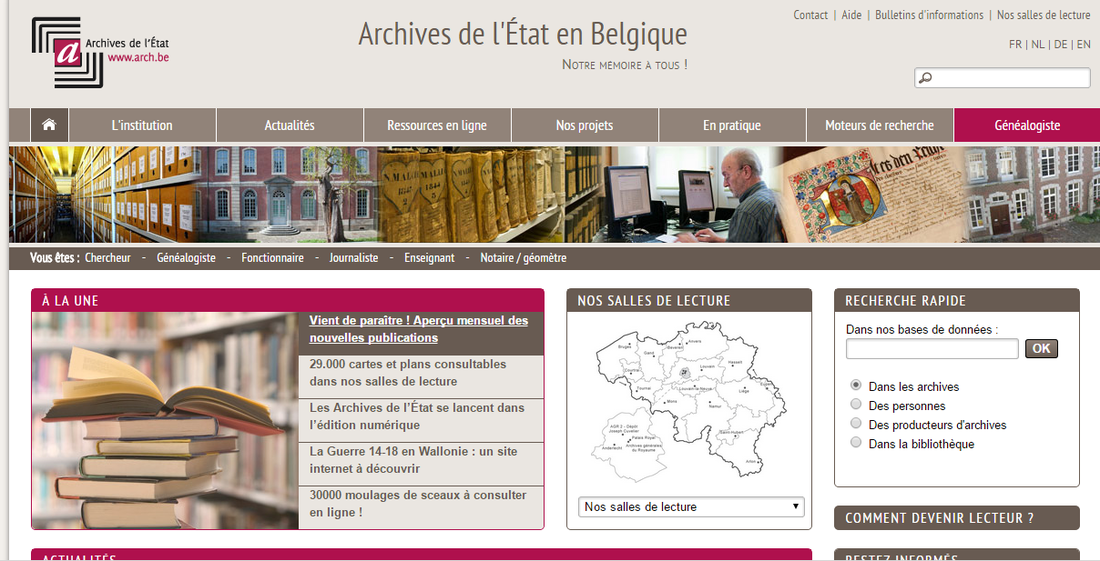
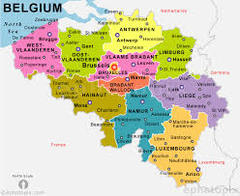
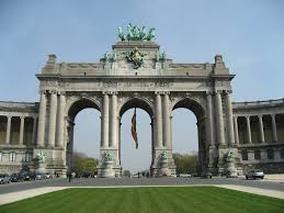
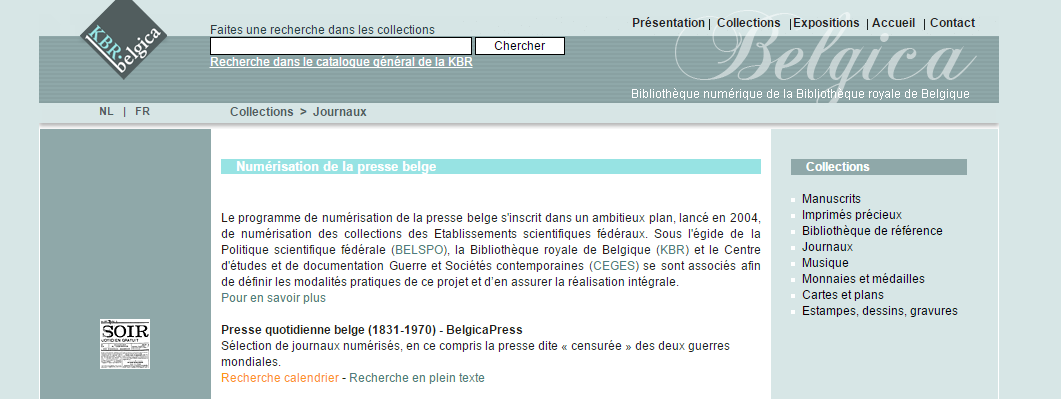
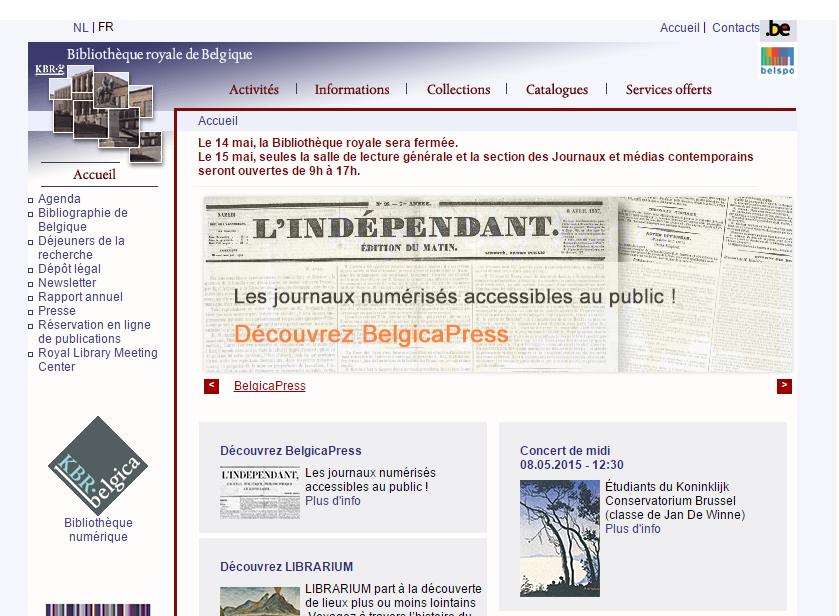
 RSS Feed
RSS Feed
